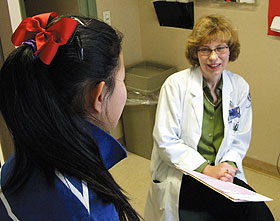  |
| HOME | THIS ISSUE | CALENDAR | PATENTS | BACK ISSUES | < BACK | NEXT > |
Health Center service offers pre-travel advice, immunizations by Chris DeFrancesco - February 11, 2008 | ||||
| It’s the time of year that might have you thinking about going to some other part of the world. Maybe you’re planning your 2008 vacation, or perhaps you just want to get closer to the equator to escape the cold. Depending on where you’re traveling, you also may want to think about pre-trip counseling and immunization. Infectious disease physicians at the UConn Health Center say it can greatly reduce the likelihood of health problems when traveling abroad. “As more and more people are heading to exotic destinations, awareness of potential travel-related illnesses allows for better preparation and smarter choices while traveling,” says Dr. Cristina Mondragon, who heads the travel clinic. “A little information goes a long way in keeping you safe and healthy when you’re far away from home.” The International Traveler’s Medical Service at the Health Center campus in Farmington and at UConn Health Partners in West Hartford offers individualized immunizations and advice about preventable travel-related illnesses. “We do a lot of preventive pre-exposure vaccination and counseling,” says Dr. Kevin Dieckhaus, director of the Infectious Diseases Division. “We evaluate based on where someone’s going, what they’re doing, and what their risk is – whether it’s malaria or yellow fever or something else – and counsel them about health habits.” The typical visitor to the travel clinic is someone who’s going to a developing area of the world, Dieckhaus says. “It’s very different going, say, to the beach in Costa Rica than it is going to the Congo. The interventions needed are very geographically based, and based somewhat on what the person’s going to be doing. For example, a trekker in Nepal may be more likely to warrant a rabies vaccine, while those headed to areas of equatorial Africa might consider meningitis vaccination, depending upon the season. Certain countries require vaccination for yellow fever prior to entry.” Mondragon recommends arranging travel counseling and immunizations four to six weeks in advance of your departure date.
“The most common illnesses are also the most preventable: hepatitis A, malaria, typhoid, diarrheal diseases,” Mondragon says. “For example, there are pills for malaria prevention and antibiotics to treat traveler’s diarrhea.” Dr. Nina Carley provides traveler’s medical services at the West Hartford office. In addition to preventive medication, visitors to either location can get travel health insurance information and the latest health and safety information about their destinations. “We keep up on what’s happening in other parts of the world, anything that might impact a traveler’s health or safety, including some information about security,” Dieckhaus says. “We provide handouts, updated on a weekly basis, that are very specific to where they’re going to be, including the latest medical and travel advisories.” Post-travel evaluation for returning travelers is also available. “Fortunately, the vast majority of travelers who follow pre-travel advice remain healthy during their trip,” says Dieckhaus. More information about the International Traveler’s Medical Service is available at http://health.uchc.edu/clinicalservices/travel/index.htm or by calling 860-679-2411. The phone number for appointments is 860-679-7692 or 800-535-6232. |
| ADVANCE HOME UCONN HOME |

